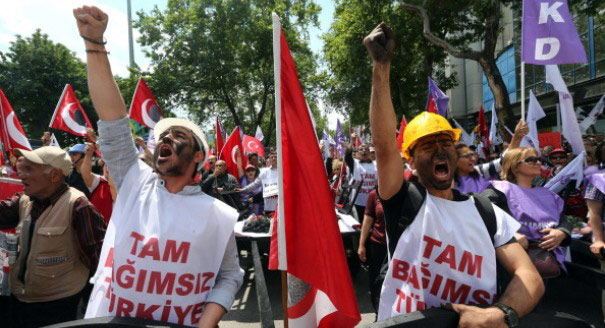- +18
James M. Acton, Saskia Brechenmacher, Cecily Brewer, …
{
"authors": [
"Marc Pierini"
],
"type": "commentary",
"blog": "Strategic Europe",
"centerAffiliationAll": "",
"centers": [
"Carnegie Endowment for International Peace",
"Carnegie Europe"
],
"collections": [
"Turkey’s Transformation"
],
"englishNewsletterAll": "",
"nonEnglishNewsletterAll": "",
"primaryCenter": "Carnegie Europe",
"programAffiliation": "",
"programs": [],
"projects": [],
"regions": [
"Middle East",
"Europe",
"Türkiye"
],
"topics": [
"Climate Change",
"Democracy",
"EU",
"Civil Society"
]
}
Source: Getty
Is There a Political Meaning to Turkey’s Mining Tragedy?
The Turkish government’s mishandling of a recent mining disaster has political implications that reach beyond the catastrophe’s massive human cost.
On May 13, the town of Soma in western Turkey was hit by a terrible mining accident that killed 301 miners. The days of official mourning are over, but the human grief and the political ripple effects will be felt for much longer. From a Western standpoint, there are observations to be made on Turkey’s mining safety record, on its privatization policies, and on the government’s handling of the tragedy.
According to available statistics, Turkey has a higher rate of casualties per ton of coal extracted than any other large producer. This fact is deeply disturbing in and of itself. Mines are a dangerous place anywhere in the world, but safety techniques are widely available, technical expertise does exist, and international norms have been devised.
So the question arises of whether the Soma miners would have been better protected if EU norms had been applied or if Turkey had ratified and implemented the International Labor Organization convention on mine safety. Ignoring international safety norms can indeed yield higher profits, but, as the Soma tragedy so sadly demonstrates, it also has a staggering human cost. For this reason alone, the Turkish parliament should seriously debate the issue of mine safety—all the more so since Turkey’s labor minister declared that the country’s coal mines should be closed down.
These factors even triggered a request by Turkey’s main opposition party, the Republican People’s Party (CHP), in October 2013 to set up a parliamentary inquiry into safety at the mine. Despite receiving the backing of the other two opposition parties, the proposal was rejected by the ruling Justice and Development Party (AKP) just weeks before the Soma tragedy.
Now, the government is running after events. As Turkish Energy Minister Taner Yıldız told the country’s parliament on May 20 during remarks on the safety procedures at Soma, “the flaws are indisputable.” Although belated, this acknowledgement is a good starting point for the inquiries and debates.
In the immediate aftermath of the tragedy, the Turkish government reacted by adopting a dismissive narrative—after all, similar accidents happened in Britain during the nineteenth century—and deploying a massive police presence around Soma, which happens to be an AKP stronghold. An adviser to the prime minister was caught on camera losing his temper and kicking a protester who had already been wrestled to the ground by two soldiers. In the province of İzmir, a thirteen-year-old boy is being prosecuted for participating in such protests.
These incidents triggered sharp reactions locally and nationwide. One Twitter user remarked that, according to the government, Turkey had reached the mining safety standards of the nineteenth century! After these unfortunate initial episodes, the government has amended its course of action, agreed to pay compensation to the miners’ families, launched an inquiry, and admitted that the mining company made mistakes.
Overall, what does the Soma tragedy tell observers about Turkey?
First, that local citizens expect simple things from their rulers: decent norms and standards in the workplace, accountability, the rule of law, and, when a tragedy hits, compassion. In Soma, too, these were the simple expectations of the families stricken by the catastrophe. Instead, the people were lambasted.
Second, and more generally, the Soma disaster has proved that when Turkey’s authorities and businesses distance themselves from EU and international norms—in this case, labor and industrial safety rules—they distance themselves from the expectations of the Turkish people. This observation goes far beyond Soma and the mining sector. By now, it is obvious that Turkish citizens expect from their politicians and businesspeople a kind of behavior worthy of the Western world to which Turkey belongs. In short, they expect dignity.
Third, for foreign observers, it would be tempting to draw drastic conclusions from such a mishandling of a massive national tragedy. But caution is needed here. In Turkey’s current political context, it would be hazardous to conclude that the Soma tragedy will have negative effects on the AKP’s standing in the country’s next two elections, a presidential poll in August and a legislative vote due by 2015. Turkish Prime Minister Recep Tayyip Erdoğan might not be affected in any measurable way by his handling of the tragedy, even though he has not sacked his ill-tempered adviser.1
The real issue has to do with the distance between Turkey’s political leadership and its citizens, including AKP supporters. The AKP remains a highly successful political party that has achieved unprecedented success at the ballot box for twelve consecutive years and improved the living standards of millions of Turks.
Yet, the AKP is now displaying a “Teflon touch” that deeply troubles many of its followers: it is insensitive to the most obvious feelings of the population, and it forges ahead relentlessly in a way that not only mesmerizes foreign observers but shocks its own sympathizers. In a country like Turkey, where there is such a passion for all things politic, this is not good news in the medium or long run.
1 Since this blog post was published, the adviser in question has been removed.
About the Author

Senior Fellow, Carnegie Europe
Pierini is a senior fellow at Carnegie Europe, where his research focuses on developments in the Middle East and Turkey from a European perspective.
- Unpacking Trump’s National Security StrategyOther
- Europe’s American PredicamentCommentary
Marc Pierini
Recent Work
Carnegie does not take institutional positions on public policy issues; the views represented herein are those of the author(s) and do not necessarily reflect the views of Carnegie, its staff, or its trustees.
More Work from Strategic Europe
- Europe on Iran: Gone with the WindCommentary
Europe’s reaction to the war in Iran has been disunited and meek, a far cry from its previously leading role in diplomacy with Tehran. To avoid being condemned to the sidelines while escalation continues, Brussels needs to stand up for international law.
Pierre Vimont
- Taking the Pulse: Can European Defense Survive the Death of FCAS?Commentary
France and Germany’s failure to agree on the Future Combat Air System (FCAS) raises questions about European defense. Amid industrial rivalries and competing strategic cultures, what does the future of European military industrial projects look like?
Rym Momtaz, ed.
- Macron Makes France a Great Middle PowerCommentary
France has stopped clinging to notions of being a great power and is embracing the middle power moment. But Emmanuel Macron has his work cut out if he is to secure his country’s global standing before his term in office ends.
Rym Momtaz
- How Europe Can Survive the AI Labor TransitionCommentary
Integrating AI into the workplace will increase job insecurity, fundamentally reshaping labor markets. To anticipate and manage this transition, the EU must build public trust, provide training infrastructures, and establish social protections.
Amanda Coakley
- Can Europe Still Matter in Syria?Commentary
Europe’s interests in Syria extend beyond migration management, yet the EU trails behind other players in the country’s post-Assad reconstruction. To boost its influence in Damascus, the union must upgrade its commitment to ensuring regional stability.
Bianka Speidl, Hanga Horváth-Sántha













